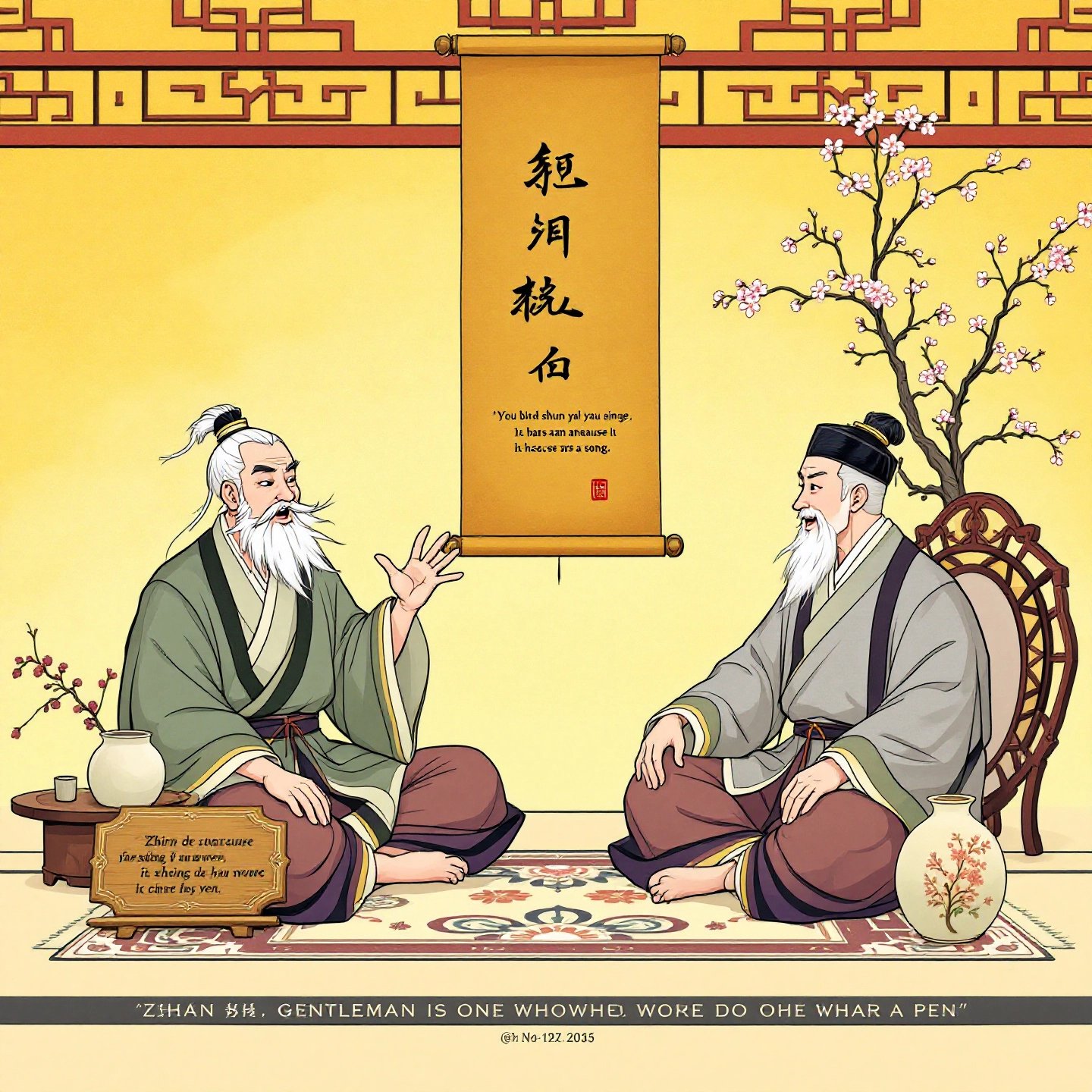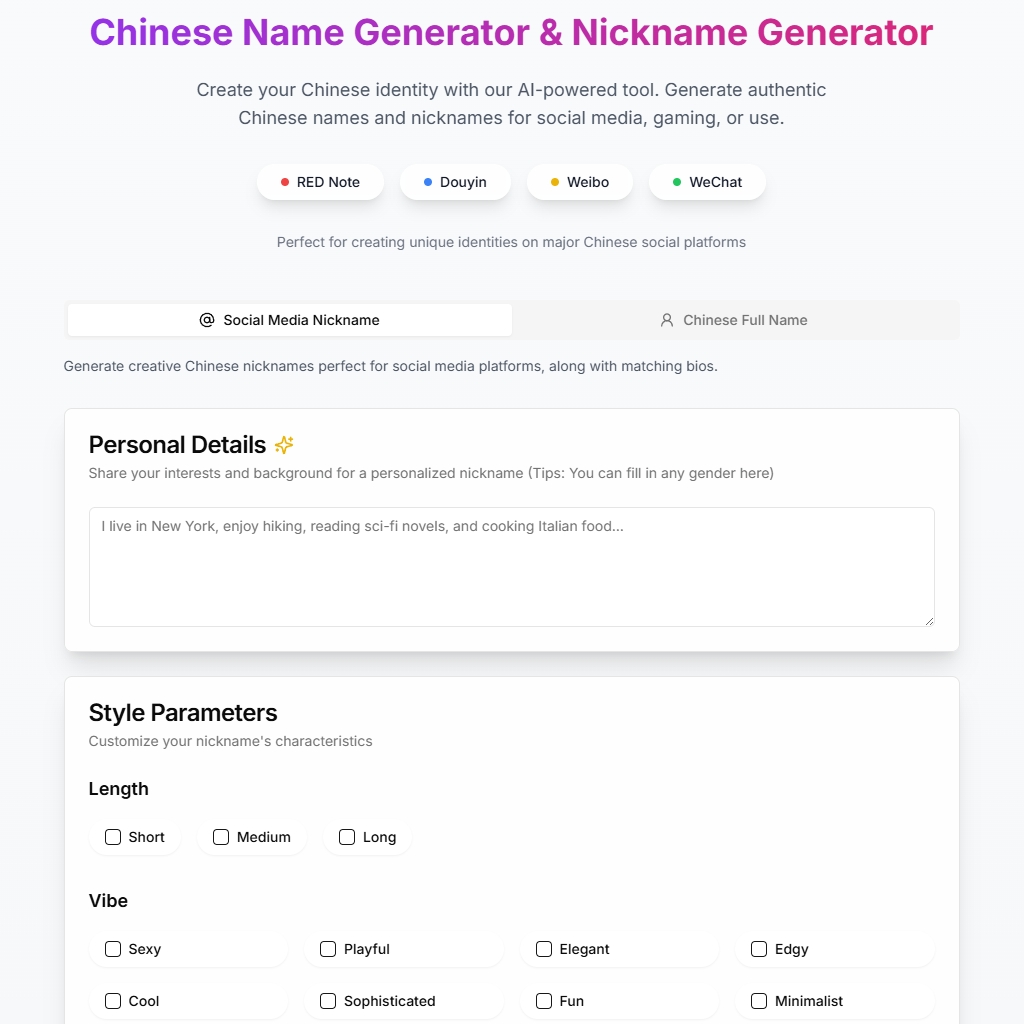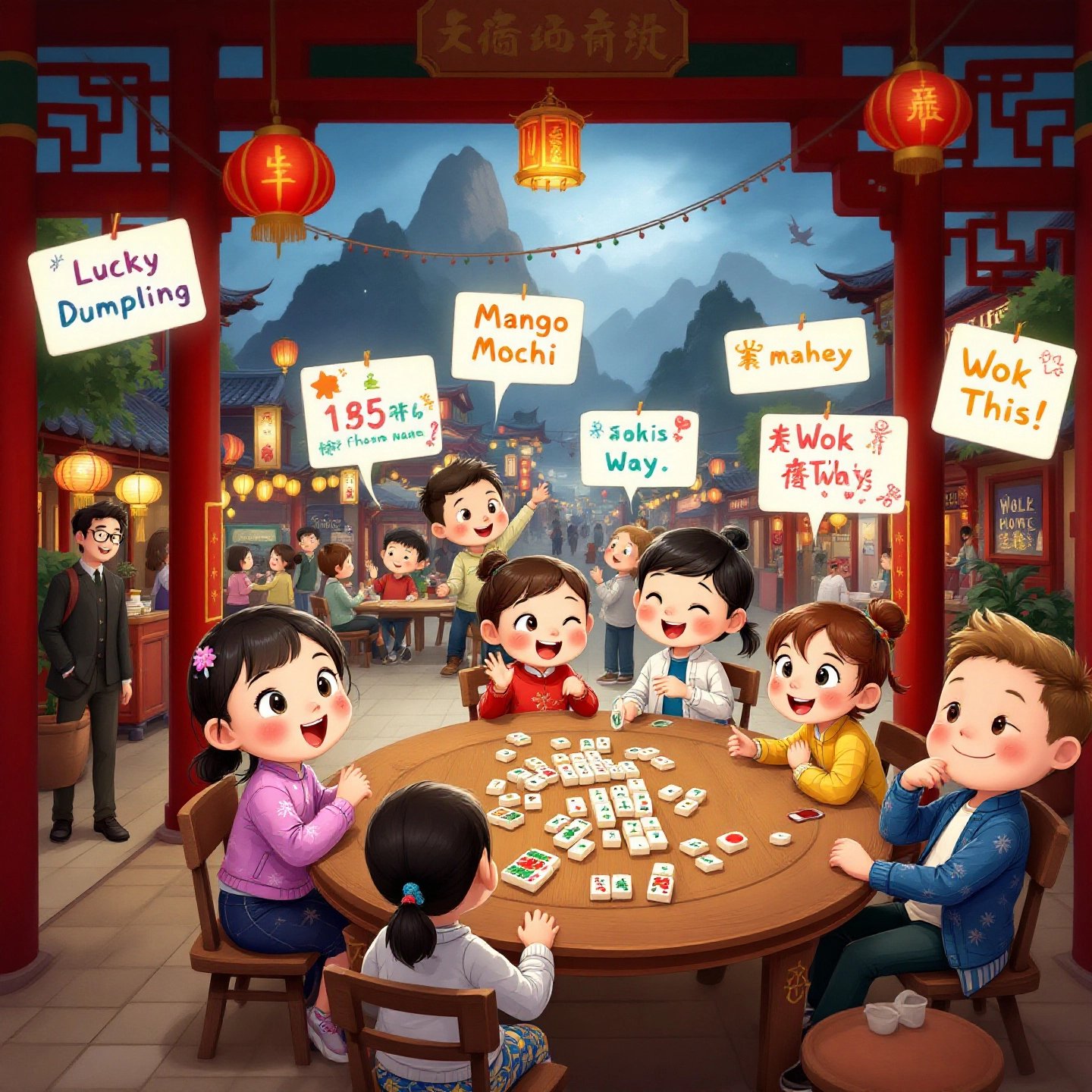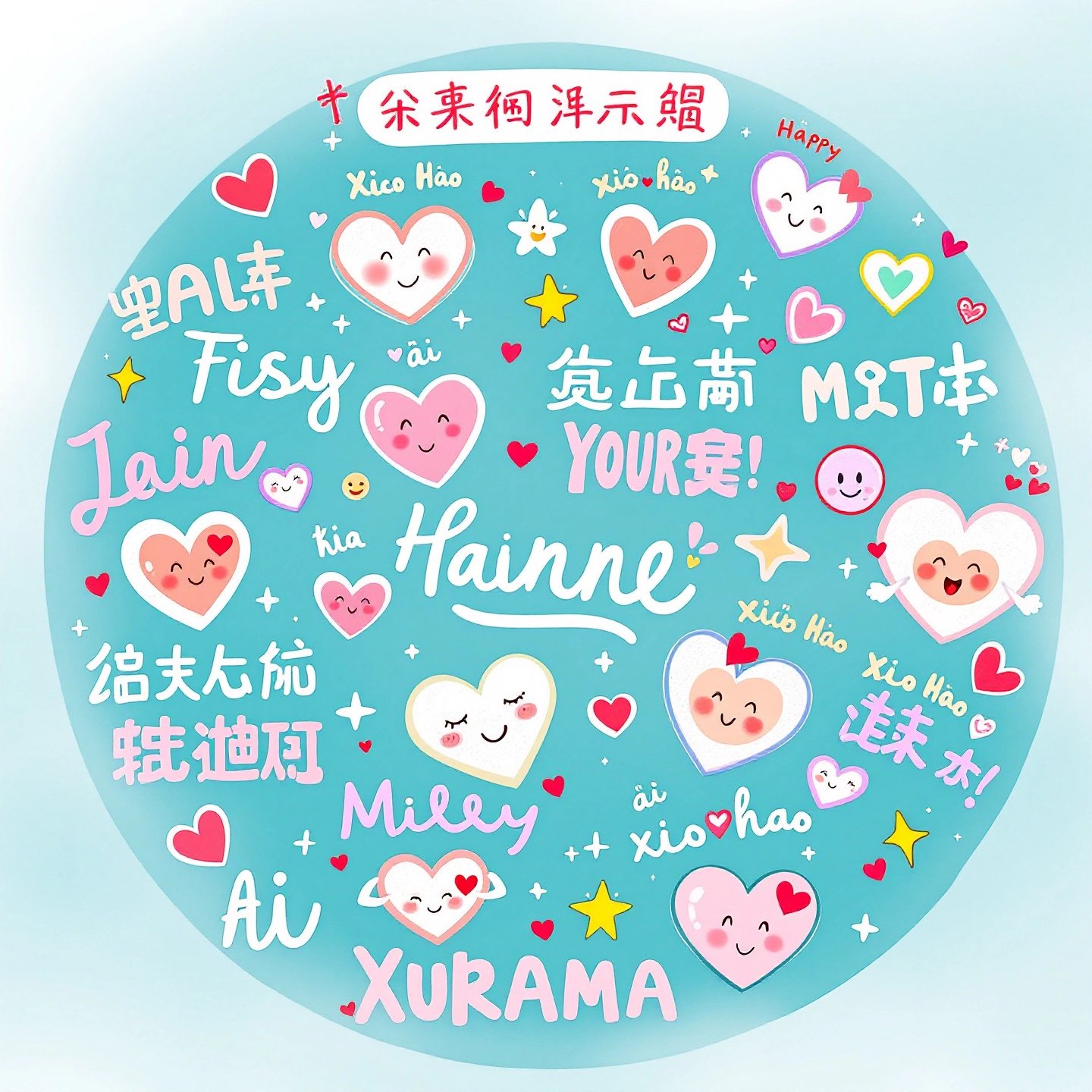Introduction to Funny Chinese Nicknames
Funny Chinese nicknames are a delightful aspect of the rich tapestry of Chinese culture, permeating various aspects of daily life and online interactions. These nicknames, often crafted with humor and creativity, serve as a bridge for bonding among friends, family, and even strangers. They are widely used across different age groups, enhancing social connections through shared laughter and understanding.
In Chinese culture, nicknames are not just casual monikers but are imbued with affection and playfulness. They often reflect personal traits, inside jokes, or even physical characteristics, making them a unique form of expression. For instance, a friend who loves to eat might be affectionately called "Little Foodie" (小吃货, xiǎo chī huò), while someone known for their strength might be dubbed "Tiger" (虎子, hǔ zi). These names foster a sense of camaraderie and intimacy, breaking down formal barriers and creating a more relaxed atmosphere.
Online communities in China have further popularized the use of funny Chinese nicknames. Platforms like WeChat and Weibo are rife with creative nicknames, often inspired by trending memes or popular culture references. This trend is especially prevalent among the younger generation, who use these names to express individuality and humor in an increasingly digital world.
Moreover, these nicknames are not limited to any specific demographic. From children to elders, everyone partakes in this cultural phenomenon. For children, nicknames often carry positive connotations and aspirations, like "Little Treasure" (小宝, xiǎo bǎo). Among adults, they can signify respect and endearment, such as using "Old Iron" (老铁, lǎo tiě) for a close friend. Thus, funny Chinese nicknames are a testament to the linguistic creativity and cultural richness of China, offering insight into the values and humor cherished by its people.

Historical Origins of Humorous Chinese Nicknames
Humor has long been an integral part of Chinese culture, and the tradition of using funny nicknames is deeply rooted in this rich heritage. Historical Chinese nicknames often draw from cultural artifacts like xiehouyu, a type of two-part proverb that combines wit and wordplay. These proverbs exemplify how humor and language intertwine to create memorable expressions that resonate across generations.
Xiehouyu are particularly fascinating, functioning as both riddles and puns. The first part of a xiehouyu sets up a scenario, while the second part, often omitted, delivers the punchline. For instance, "Nephew handling a lantern—illuminating his uncle" (外甥打灯笼——照舅) uses a homophonic pun, where "illuminating his uncle" can also mean "according to the old way" due to similar sounds in Mandarin. Such linguistic creativity is a hallmark of historical Chinese nicknames, showcasing the playful nature of the language (source).
Over time, these humorous expressions have evolved, maintaining their relevance in modern language. The use of humor in nicknames is not merely for entertainment; it reflects societal values and attitudes. In ancient times, humor served as a subtle form of social commentary, allowing people to express opinions on sensitive topics indirectly. This tradition continues today, with modern nicknames often reflecting contemporary cultural trends and societal norms.
In essence, the historical roots of funny Chinese nicknames highlight the enduring nature of humor in Chinese society. They reveal how language can be both a tool for communication and a medium for cultural expression. As these nicknames have evolved, they have retained their core function: to connect people through shared laughter and understanding. This cultural legacy ensures that humorous nicknames remain a vibrant part of Chinese life, bridging the past and present through the universal language of humor.
The Role of Homophonic Puns in Chinese Nicknames
Homophonic puns are a fascinating linguistic phenomenon in Chinese, playing a crucial role in the creation of funny Chinese nicknames. These puns leverage the tonal nature of the Chinese language, where words with different meanings but similar sounds can be humorously interchanged. This linguistic creativity not only entertains but also serves as a subtle tool for social expression.
A classic example of such a pun is the 'Grass Mud Horse' (草泥马, cǎo ní mǎ), which sounds similar to a vulgar phrase but is written with entirely different characters. This nickname emerged as a playful yet pointed form of social commentary, cleverly sidestepping censorship while critiquing certain aspects of society (source).
Another notable example is the 'River Crab' (河蟹, hé xiè), which sounds like 'harmony' (和谐, héxié) in Chinese. This pun was popularized as a satirical reference to the concept of a 'harmonious society,' a term frequently used in official discourse. By using such puns, Chinese netizens can creatively express dissent or humor without directly confronting sensitive topics.
The crafting of these puns requires a deep understanding of the language's phonetic subtleties. It involves selecting characters that not only sound alike but also convey a different, often humorous or critical, meaning. This process highlights the ingenuity of Chinese speakers in using language as a flexible and dynamic tool for communication.
Moreover, the use of homophonic puns extends beyond social commentary. They are integral to everyday humor, enriching conversations with layers of meaning that can be appreciated by those familiar with the language. This dual function of entertainment and expression makes funny Chinese puns a cherished part of the cultural landscape.
Thus, homophonic puns are more than just a linguistic curiosity; they are a vibrant expression of cultural identity and creativity. As language continues to evolve, these puns remain a testament to the playful and adaptive nature of Chinese communication, ensuring that humor remains a lively part of social interaction.
Popular Funny Chinese Nicknames in Modern Culture
In today's fast-paced world, modern Chinese nicknames have become an integral part of popular culture, especially when it comes to celebrities and public figures. These nicknames often reflect the public persona of the individual or play on their names in humorous ways, making them memorable and endearing to fans. Here, we explore some of the most widely recognized funny Chinese nicknames that have captured the imagination of the masses.
- Mariah Carey - Cow Sister (牛姐, niú jiě): This nickname is a playful nod to her powerful vocals, as '牛' (niú) is slang for 'awesome' in Chinese.
- Ariana Grande - Little Cow (小牛牛, xiǎo niú niú): As a young singer with impressive talent, she is affectionately dubbed the 'Little Cow,' a reference to her vocal prowess, akin to Mariah Carey.
- Taylor Swift - Unlucky/Moldy (霉霉, méi méi): This nickname humorously reflects her publicized romantic challenges and her journey in the music industry.
- Katy Perry - Fruit Sister (水果姐, shuǐ guǒ jiě): Inspired by her vibrant, fruit-themed outfits early in her career, this nickname captures her colorful persona.
- Nicki Minaj - Numbing Spicy Chicken (麻辣鸡, málàjī): A play on her stage name, this nickname highlights her bold style and fiery personality.
- Kim Kardashian - Gold Aunty (金大妈, jīn dà mā): Reflecting her luxurious lifestyle and business acumen, this nickname is both humorous and indicative of her public image.
- Chris Hemsworth - Hammer Brother (錘哥, chuí gē): Known for his role as Thor, this nickname is a direct reference to his iconic character's weapon.
- Bruno Mars - Mars Brother (火星哥, huǒ xīng gē): This nickname cleverly uses the Chinese word for Mars, aligning with his stage surname and universal appeal.
- Britney Spears - Little Sweetie (小甜甜, xiǎo tián tián): Capturing her sweet voice and image, this nickname is a term of endearment among her fans.
- One Direction - Little Broken Team (小破团, xiǎo pò tuán): Following Zayn Malik's departure, this nickname humorously reflects the band's change in dynamics.
- Jennifer Lopez - Lord of Butt (籮霸, luó bà): A cheeky reference to her famous figure, this nickname is both humorous and affectionate.
These modern Chinese nicknames not only provide a humorous twist to celebrity identities but also reflect cultural nuances and the playful creativity inherent in the language. They serve as a bridge between the celebrity's public persona and their fan base, offering a unique way to engage and connect with audiences. As such, these nicknames continue to be a vibrant part of contemporary Chinese culture, illustrating the enduring appeal of humor and creativity in language.

Internet Memes and the Rise of New Nicknames
The digital age has revolutionized how funny Chinese nicknames are created and shared, with internet memes playing a pivotal role in this transformation. Chinese internet culture thrives on creativity and humor, and the rise of social media platforms like Weibo and WeChat has accelerated the spread of these amusing monikers. Internet memes, often characterized by their rapid virality and humorous undertones, have become a fertile ground for the birth of new nicknames.
One such example is the term "Duang," which became a viral sensation after it was used by Jackie Chan in a shampoo commercial. The word itself is a sound effect with no specific meaning, yet it captured the imagination of netizens who began using it to express surprise or astonishment. This phenomenon illustrates how a simple sound can evolve into a cultural meme, further demonstrating the linguistic creativity prevalent in Chinese internet culture (source).
Another notable example is "Diaosi," a term that originated from online gaming communities and has since become a widely recognized nickname. Initially used to describe young men from humble backgrounds, "Diaosi" has been embraced by many as a badge of honor, reflecting a self-deprecating humor and resilience. It highlights how internet memes can encapsulate complex social narratives, offering insights into the aspirations and challenges of contemporary Chinese youth (source).
Social media platforms are instrumental in popularizing these nicknames, providing a space where users can share, modify, and propagate them at lightning speed. The interactive nature of social media encourages participation, allowing users to contribute their own interpretations and variations, thus keeping the memes fresh and dynamic.
The influence of internet memes on the evolution of funny Chinese nicknames underscores the adaptability of language in the digital era. These nicknames not only serve as a form of entertainment but also reflect deeper cultural and societal trends. As internet culture continues to evolve, it is likely that new nicknames will emerge, shaped by the ever-changing landscape of digital communication. This ongoing evolution ensures that humor remains a vibrant and integral part of Chinese internet culture, connecting people through shared laughter and creativity.
Cultural Significance and Social Commentary
Funny Chinese nicknames do more than just amuse; they provide a window into the societal attitudes and values prevalent in China. These nicknames often carry deeper meanings, serving as a form of social commentary that reflects cultural nuances and collective sentiments. By examining these humorous expressions, we can glean insights into how language is used to navigate social norms and express individuality.
At the heart of the cultural significance of nicknames lies their ability to capture the essence of interpersonal relationships. In a society where community and family are paramount, nicknames often reflect the importance of these bonds. For example, calling someone "Old Iron" (老铁, lǎo tiě) signifies a deep friendship, akin to a relationship as strong as iron. Such nicknames highlight the value placed on loyalty and camaraderie, illustrating how language reinforces social ties.
Moreover, funny Chinese nicknames can act as subtle critiques of societal norms. By using humor, individuals can comment on or question social conventions without overt confrontation. This is evident in nicknames that play on words or use puns, offering a light-hearted yet pointed reflection on cultural or political topics. These nicknames allow for a form of expression that is both safe and impactful, resonating with those who understand the underlying messages.
For instance, the nickname "River Crab" (河蟹, hé xiè), which sounds like "harmony" (和谐, héxié), is used to humorously critique the concept of enforced societal harmony. It serves as a reminder of the tensions between individual expression and collective conformity, showcasing the power of language to convey complex ideas in an accessible manner.
In essence, the cultural significance of funny Chinese nicknames extends beyond mere entertainment. They are a testament to the creativity and resilience of the Chinese people, who use language as a tool for both connection and commentary. As these nicknames evolve, they continue to reflect the dynamic interplay between tradition and modernity, offering a unique lens through which to view Chinese society.
Creating Your Own Funny Chinese Nickname
Imagine introducing yourself with a witty, culturally rich nickname that not only makes people chuckle but also reflects your personality. Crafting your own funny Chinese nickname can be a rewarding endeavor, allowing you to blend creativity with cultural nuance. Here’s a guide to help you embark on this entertaining journey of nickname creation.
Understanding the Basics
To create a Chinese nickname that resonates, it’s essential to understand the linguistic and cultural elements involved. Chinese nicknames often rely on wordplay, homophonic puns, and cultural references. For instance, a name that sounds like a popular phrase or carries a humorous meaning can be both memorable and amusing.
Start by considering your personal traits, interests, or even favorite jokes. Are you known for your quick wit or love for a particular hobby? These elements can provide a foundation for your nickname. Additionally, understanding basic Chinese characters and their meanings can enhance your creativity.
Steps to Craft Your Nickname
Here’s a step-by-step guide to help you create a funny Chinese nickname:
| Step | Description | Example |
|---|---|---|
| 1. Identify Your Traits | Think about your personality, habits, or quirks. | Love for food |
| 2. Choose Relevant Characters | Select Chinese characters that represent these traits. | 吃货 (chī huò) - Foodie |
| 3. Play with Sounds | Create puns or homophones that sound funny. | 吃货 (chī huò) sounds like "chi ho" |
| 4. Check Cultural References | Ensure the nickname aligns with cultural norms and humor. | Compare with popular nicknames |
| 5. Test It Out | Say it aloud, share with friends, and see the reaction. | "Meet my friend, 小吃货 (Little Foodie)" |
Using CNG's Chinese Name Generator
For those who prefer a more guided approach, tools like CNG's Chinese Name Generator can be invaluable. This AI-powered tool offers culturally authentic and personalized name suggestions, perfect for creating funny Chinese nicknames. Whether you’re looking for something short and catchy or a more elaborate moniker, this tool provides a seamless experience.
By inputting your interests and desired style, CNG’s generator tailors names that balance humor with cultural accuracy, ensuring your new nickname is both entertaining and respectful. Explore this tool to discover a name that fits your personality and stands out in any social setting.
Creating a funny Chinese nickname is not just about humor; it’s about crafting a unique identity that resonates with you and your audience. As you experiment with different ideas, remember to enjoy the process and embrace the creativity it inspires. Who knows? Your new nickname might just become the next viral sensation!

The Impact of Censorship on Nickname Usage
In China, the interplay between creativity and regulation is vividly illustrated in the realm of funny Chinese nicknames. As these nicknames often serve as a form of social commentary, they frequently navigate the boundaries set by Chinese censorship. The government's stringent regulations aim to maintain social stability and protect national interests, which inevitably influences how nicknames are crafted and circulated.
One of the primary mechanisms of control is the requirement for real-name registration on social media platforms, as mandated by the Cyberspace Administration of China. This regulation, in place since 2015, obliges users to register their accounts with their real identities, thereby limiting the use of potentially "harmful" usernames that could threaten national security or social harmony (source).
Despite these constraints, Chinese netizens have shown remarkable ingenuity in adapting to these restrictions. They employ homophones, variant characters, and creative "typos" to bypass automatic censorship filters. For instance, the nickname "Grass Mud Horse" (草泥马) cleverly evades censors while conveying a subversive message. This linguistic creativity is not just a means of evasion but a testament to the resilience of cultural expression amid regulatory constraints.
However, the effectiveness of these workarounds is diminishing. As the language used to circumvent censorship becomes more abstract, it risks becoming inaccessible to a broader audience, effectively confining the message to a niche group. This phenomenon highlights the delicate balance between maintaining creative expression and adhering to regulatory frameworks.
In conclusion, while Chinese censorship poses significant challenges to the creation and dissemination of funny nicknames, it also fuels a unique form of linguistic innovation. Netizens continue to explore creative avenues to express individuality and social critique, demonstrating the enduring power of humor and language in navigating the complexities of modern Chinese society.
Funny Chinese Nicknames Examples
Exploring the world of funny Chinese nicknames reveals a delightful array of names that capture the essence of humor and affection in Chinese culture. These nicknames often carry meanings that are both endearing and amusing, reflecting personal traits, cultural references, or playful puns. Here, we present a curated list of examples of Chinese nicknames, complete with their meanings and contexts, to offer a glimpse into this charming aspect of the language.
- 小吃货 (Xiǎo chī huò) - Little Foodie: Used for someone who loves food, this nickname is both affectionate and humorous, highlighting a person's passion for eating.
- 小傻瓜 (Xiǎo shǎ guā) - Little Silly Melon: A playful term of endearment often used between friends or loved ones, suggesting a mix of affection and gentle teasing.
- 老铁 (Lǎo tiě) - Old Iron: Signifying a strong, dependable friendship, this nickname is commonly used among close friends to express loyalty and camaraderie.
- 胖子 (Pàng zi) - Fatty: While it might sound harsh, this nickname is often used affectionately among friends or family members, reflecting a close-knit bond and shared humor.
- 笨蛋 (Bèn dàn) - Dumb Egg: A light-hearted, teasing nickname used among friends to highlight a funny mistake or goofy moment.
- 小公主 (Xiǎo gōng zhǔ) - Little Princess: Often used for a beloved daughter or girlfriend, this nickname conveys warmth and affection, treating the person as precious and cherished.
- 熊熊 (Xióng xióng) - Bear: A nickname for someone who is strong or cuddly, similar to a bear, used affectionately among friends or partners.
- 土豆 (Tǔ dòu) - Potato: A quirky nickname for someone who enjoys lounging or is particularly laid-back, often used humorously among close friends.
- 亲亲 (Qīn qīn) - Kissy: An intimate nickname for couples, denoting affection and a close bond, often used to express love and tenderness.
- 小宝 (Xiǎo bǎo) - Little Treasure: Used for children or loved ones, this nickname signifies their invaluable place in the speaker's heart, filled with love and care.
These examples of Chinese nicknames illustrate the playful and affectionate nature of the language, showcasing how humor and creativity are woven into everyday interactions. Whether used among friends, family, or romantic partners, these nicknames enrich relationships by adding a layer of warmth and personal connection. As you explore these funny nickname meanings, you'll notice how they reflect both individual personalities and broader cultural themes, offering a unique insight into the values and humor cherished in Chinese society.
Conclusion
Funny Chinese nicknames are more than just playful monikers; they are a vibrant expression of cultural identity and creativity. These nicknames, deeply rooted in Chinese society, offer a unique lens through which to view interpersonal relationships and social dynamics. They embody the importance of humor and linguistic ingenuity in modern Chinese society, reflecting values such as camaraderie, affection, and even subtle social commentary.
In today's interconnected world, the significance of these nicknames extends beyond personal interactions. They serve as a bridge between traditional cultural expressions and contemporary digital communication, highlighting the adaptability of language in an ever-evolving society. As such, they remain a cherished part of the cultural fabric, offering insight into the collective psyche of a nation that values both tradition and modernity.
For those intrigued by the art of nickname creation, tools like CNG's Chinese Name Generator provide a perfect starting point. This AI-powered tool allows users to craft personalized and culturally authentic nicknames with ease. Whether you're seeking a humorous alias for social media or a meaningful name for personal branding, the generator offers a seamless way to explore the rich tapestry of Chinese naming conventions.
By embracing the charm of funny Chinese nicknames, individuals can foster deeper connections and enjoy a playful exploration of language and culture. As you delve into this world, remember that each nickname carries with it a story—a testament to the creativity and warmth that define Chinese communication. So, why not take a step into this whimsical realm and create a nickname that captures your essence?
Frequently Asked Questions
1. What are some Chinese nicknames?
Chinese nicknames often reflect personal traits or cultural references, such as 'Little Treasure' (小宝) for someone cherished or 'Old Iron' (老铁) for a dependable friend.
2. What are silly nicknames?
Silly nicknames are playful and humorous, often based on puns or personal traits, like 'Giggles McGee' or 'Little Foodie' (小吃货) in Chinese.
3. What to call your Chinese boyfriend?
In Chinese, you might call your boyfriend '宝贝' (bǎobèi) meaning 'baby' or 'treasure,' reflecting affection and intimacy.
4. What do Chinese friends call each other?
Chinese friends often use nicknames based on personal traits or inside jokes, like 'Old Iron' (老铁) for close friends, emphasizing loyalty.
5. How do internet memes influence Chinese nicknames?
Internet memes popularize new nicknames by using humor and virality, such as 'Duang' for surprise, reflecting cultural trends and creativity.



